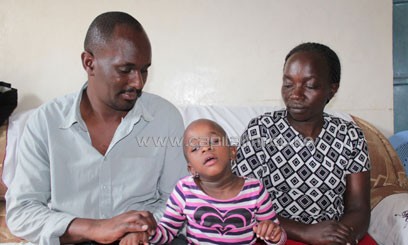
Grace was what you’d call a ‘preemie’ her mother having gone into pre-term labour at seven months/MAGARA FELIX
NAIROBI, Kenya, May 22 – Grace’s dad, like many other fathers out there, is trying to break the thumb sucking habit his four year old daughter.
Unlike the majority of fathers however, when he receives Grace’s report form at the end of the school term, he doesn’t learn how well she did in Kiswahili or English or Math.
He gets appraised on her vision, hearing, communication skills, self-help skills, physical skills, cognitive skills and her, ‘gross’ motor development.
You see, Grace is unlike most children who at the age of four can use the potty and walk. “The house help carries Grace to school on her back and she has to make sure Grace has a pamper on or she’ll pee on her back,” Grace’s dad, Geoffrey Mwangi, tells Capital FM News during an interview at his Kayole home.
The walls at the home are lined with cushions to keep the deaf and blind Grace from hurting herself, “My miracle like every other four year old is quite playful but unlike every other four year old she can’t see or hear danger,” Geoffrey explains.
He calls Grace his miracle because he and his wife Jane have seen her come back from near death, “We have been fighting for Grace even before she was born. That’s why we named her Grace,” he says.
Grace was what you’d call a ‘preemie’ her mother having gone into pre-term labour at seven months. “I left work one evening and my water just broke. I didn’t know what the problem was because I had never even caught a cold when I was pregnant with Grace.”
Grace came out of Jane’s womb with many of her organs, including her eyes and ears, not fully developed, “her digestive tract wasn’t developed either,” Jane recalls, “she was so sickly that they had to give her blood through a vein in her head.”
Despite spending a month and a half in an incubator, Geoffrey remembers as he wipes a tear from his eyes, Grace’s condition did not seem to be improving, “the doctors said there was not much more they could do for us and that it was only a matter time.”
“That’s when the doctors at Kenyatta decided to try the Kangaroo as a last resort,” Jane continues, “it was the first time they’d tried it and it worked because two weeks later Grace’s digestive tract began to work and I took her home. I never lost faith.”
It’s the same faith that Jane and Geoffrey hold on to now that Grace’s last report form reads, “she seems to follow light,” under vision and, “she seems to respond to sounds,” under hearing.
“The doctors say her eyes will continue to develop until she’s eight years old,” Jane explains, “so there’s light at the end of the tunnel on that front but she’ll need surgery to improve her hearing.”
And although the surgery Grace requires that runs into millions is out of her parents’ financial reach at the moment, Geoffrey is optimistic things will turn out for the best.
“The best a lot of disabled people in this country can hope for is vocational training but even if my Grace doesn’t grow to see or hear I believe there is a purpose to all that she’s endured in her short life. I believe Helen Keller’s deaf blindness is what gave her a story to write and great faith. Because all you can do when you can’t see or hear is believe.”









































